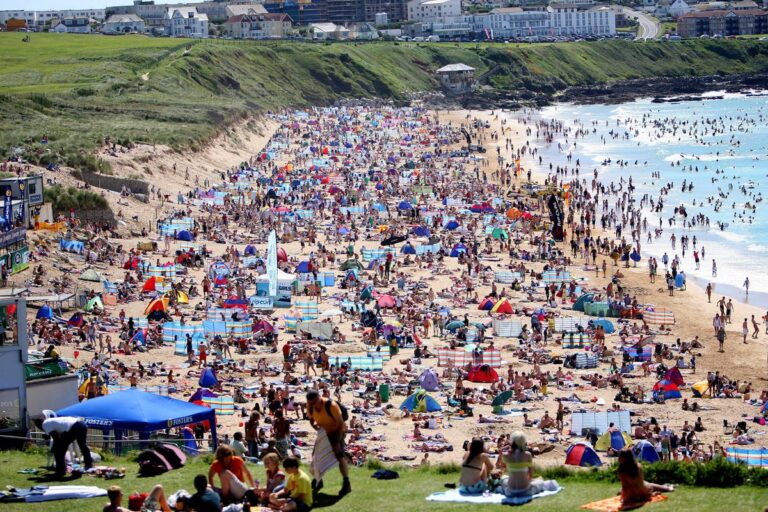I was disgusted when I heard that Barcelona residents were using water guns to deter foreign tourists, as if that would solve the problem of overtourism; all it would do is give tourists a fun story to take home.
Anti-tourist sentiment runs similarly strong in West Cornwall, where I live, but locals here accept being inundated with visitors at a time when they would rather be enjoying the place alone, because tourism has its good and bad sides.
Like many beautiful rural areas with cute towns and interesting histories, Cornwall makes its living from tourists. The population rises like a rising tide, and every year seems to have a bigger impact on those of us who live here. From bucket and shovel shops (yes, they still exist) to fish and chip shops, Airbnbs to supermarkets, businesses depend on the influx of tourists; staff are plucked away for the summer season, and they provide work for locals who spend the rest of the year reeling from Universal Credit to minimum wage jobs or zero hours contracts.
My 16-year-old daughter has a summer job waiting for people in a fish and chip shop in St Ives. Half the staff are her age, earning £8 an hour, and are all born and raised locally. From her first day on the job, she’s been in the mindset of “tourists are a real nuisance, but they pay me, so I have to be nice and smiley.” I have a friend who works seasonal cleaning, but it’s a tough, underpaid, thankless job and there are never enough cleaners for the thousands of rooms that are rented out each summer, and it breeds resentment.
“Our” beaches are crowded and littered with discarded barbecues and beer bottles. Snobbish tourist hotspots like Mousehole, St Ives and Port Isaac are off-limits to us locals. During the summer, my kids and I spend our time in the garden, walking the coast paths and going to the park. I don’t take them to the beach after 4pm, until they’ve packed their bags to go home and there’s a half chance we’ll be able to park in the (ridiculously expensive) beach car park.
Emmets is Cornish for ants and in local slang it means holidaymakers, those hordes of tourists that we hate so much, but can’t hate too much because without them we’d be penniless.
But there’s no way to control the numbers that flock to the county at this time of year; the seasonal horror of driving anywhere is something we locals have to endure. So you can see why there’s such a strong “national” identity here in Cornwall – the black and white St Piran’s flag stickers on cars, the Song of the Sea, the Cornish translations on road signs, buses and supermarkets. I wouldn’t even call myself a local; sure, my children finished primary and secondary school here, but I’m also an Emmett, a Londoner who moved here just 13 years ago. If push came to shove, I’d easily be lumped in with the outsiders.
Even the notorious water companies love to hate tourists. With the population tripling in summer, South West Water benefits financially from a huge increase in water use… but invariably, there’s a huge flood of raw sewage, and lifeguards spring into action, calling for everyone to get out of the water as big brown streaks spill into the turquoise bay. “It’s the tourists’ fault,” they’ll say. “Too many wet wipes clogging the sewage treatment plants.”
The A30, the main road that runs from Exeter to the tip of Cornwall, is also a pain. Sections have been under construction for two years, doubling or tripling travel times from west Cornwall to most other places. Now that it’s finished, a Facebook comment is telling: “This will get tourists here quicker.” And sure enough, traffic at my local roundabout means it now takes four times as long to drive to the local train station. And the summer holidays haven’t even started yet.
Whenever I hear people in Cornwall complain, or whenever I find myself venting my frustrations, I always ask myself: “But what can be done?”, my dear comrades from Barcelona, and I realise the answer is: nothing can be done.
When regions and cities build their entire economies around tourists, we are forced to accept environmental damage, resentment, and a gig economy-dependent livelihood. Is there any other way?

